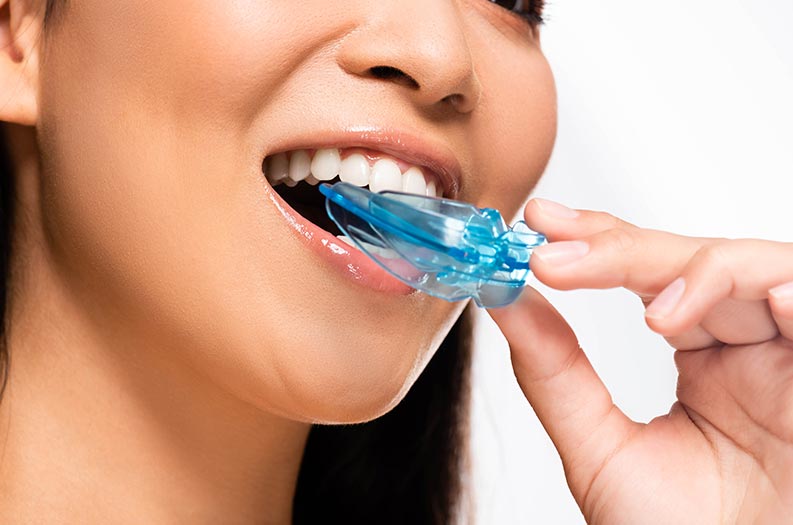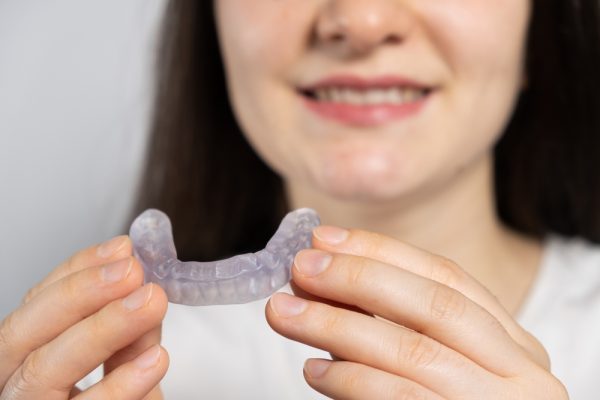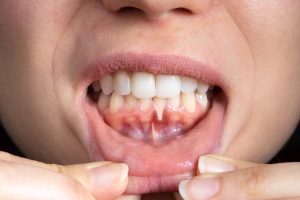Night Guards in Owasso, OK

Custom Night Guards to Stop Teeth Grinding and Protect Your Smile
Do you wake up with jaw pain, headaches, or sore teeth? Are your teeth showing signs of wear from grinding or clenching during sleep? At Lexington Dental of Owasso, Dr. Jacob Cary provides custom-fitted night guards to protect your teeth from the damaging effects of bruxism (teeth grinding and clenching). Our Owasso, OK, dental practice serves patients throughout Tulsa, Collinsville, and surrounding communities with comfortable, durable night guards that provide relief from grinding-related symptoms and prevent long-term dental damage.
Stop teeth grinding damage before it’s too late – call Lexington Dental of Owasso at (918) 274-8500 to schedule your night guard consultation today.
World-Class Expertise Rooted in Local Heritage
Led by Dr. Jacob Cary, DDS—a graduate of the prestigious New York University College of Dentistry—Lexington Dental of Owasso brings elite-level training back to our Oklahoma community, where Dr. Cary was raised on a family farm. This blend of Ivy League precision and heartfelt local insight creates dental solutions that feel intuitively right for Owasso families, fostering trust from the first visit.
Dr. Cary’s background ensures modern, evidence-based techniques delivered with the warmth of someone who understands our rural roots. Our team of dedicated hygienists and coordinators extends this personal touch, making us Owasso’s go-to for intuitive, compassionate dentistry that goes beyond routine check-ups.
- NYU-Trained Innovation: Cutting-edge procedures informed by top-tier education.
- Farm-Raised Empathy: A genuine connection that builds lifelong patient relationships.
- Holistic Family Focus: Serving every generation with the care of a trusted neighbor.

What Are Night Guards?
Night guards are custom-made dental appliances designed specifically to protect your teeth from the harmful effects of bruxism, which includes teeth grinding and jaw clenching that occur during sleep. These protective devices are worn over either the upper or lower teeth and create a barrier that prevents tooth-to-tooth contact, absorbing and distributing the forces generated by grinding and clenching activities.
Unlike sports mouth guards or over-the-counter options, night guards are precisely crafted from durable materials that can withstand the repetitive forces of bruxism while maintaining comfort throughout the night. Dr. Cary designs each night guard to fit your unique bite and jaw alignment, providing optimal protection while allowing for comfortable breathing and natural jaw movement during sleep.
Types of Night Guard Materials
Different materials offer varying benefits based on individual needs:
- Soft Materials: Comfortable for light grinders but may wear out more quickly with heavy grinding, suitable for patients with mild bruxism or those adjusting to night guard use.
- Hard Acrylic: Extremely durable for heavy grinders, providing maximum protection against severe grinding forces while maintaining a precise fit over extended periods.
- Dual-Layer Construction: Combines soft inner surface for comfort with hard outer surface for durability, offering both protection and comfort for moderate to heavy grinders.
Dr. Cary selects the most appropriate material based on your grinding intensity, comfort preferences, and specific protection needs.
Bruxism and Its Effects
 Bruxism affects millions of Americans, with many people unaware they grind or clench their teeth during sleep until damage becomes apparent. This unconscious habit can exert forces of up to 250 pounds per square inch on teeth, far exceeding the normal 20-25 pounds of pressure used during regular chewing.
Bruxism affects millions of Americans, with many people unaware they grind or clench their teeth during sleep until damage becomes apparent. This unconscious habit can exert forces of up to 250 pounds per square inch on teeth, far exceeding the normal 20-25 pounds of pressure used during regular chewing.
The causes of bruxism are multifaceted and can include stress, anxiety, sleep disorders, certain medications, caffeine consumption, and bite irregularities. Some people develop bruxism as a response to life changes, work stress, or other emotional factors, while others may have a genetic predisposition to this condition.
Left untreated, bruxism can cause significant damage to teeth, dental restorations, jaw joints, and surrounding muscles. The grinding action wears down tooth enamel, leading to sensitivity, fractures, and increased risk of decay. Additionally, the constant pressure can cause headaches, jaw pain, and temporomandibular joint (TMJ) disorders that affect daily activities and quality of life.
Signs and Symptoms of Teeth Grinding
Many people with bruxism are unaware of their condition since it occurs during sleep. Common signs and symptoms include:
Physical Symptoms
 Morning Jaw Pain: Waking up with sore jaw muscles, facial pain, or difficulty opening your mouth fully, indicating overuse of jaw muscles during sleep from grinding or clenching activities.
Morning Jaw Pain: Waking up with sore jaw muscles, facial pain, or difficulty opening your mouth fully, indicating overuse of jaw muscles during sleep from grinding or clenching activities.- Chronic Headaches: Frequent tension headaches, especially upon waking, that result from muscle strain and tension in the jaw, face, and neck areas from nighttime grinding.
- Tooth Sensitivity: Increased sensitivity to hot, cold, or sweet foods and beverages due to worn tooth enamel exposing the sensitive inner layers of teeth.
- Ear Pain: Aching or fullness in the ears without infection, caused by referred pain from overworked jaw muscles and TMJ stress from grinding activities.
Dental Signs
 Worn Tooth Surfaces: Flattened, chipped, or fractured teeth, particularly on the chewing surfaces, indicate excessive wear from grinding forces during sleep.
Worn Tooth Surfaces: Flattened, chipped, or fractured teeth, particularly on the chewing surfaces, indicate excessive wear from grinding forces during sleep.- Loose or Damaged Restorations: Crowns, fillings, or other dental work that become loose, cracked, or fall out due to the excessive forces generated by teeth grinding.
- Gum Recession: Pulling away of gum tissue from teeth due to the stress and pressure placed on teeth and supporting structures during grinding episodes.
- Tooth Mobility: Teeth that feel loose or shift position due to the constant pressure and trauma from grinding forces affecting the supporting bone and ligaments.
Benefits of Custom Night Guards
Professional night guards provide numerous advantages over store-bought alternatives and no treatment:
- Complete Tooth Protection: Custom night guards create a protective barrier that prevents direct tooth-to-tooth contact, eliminating wear, chips, and fractures caused by grinding forces.
- Muscle Relaxation: By maintaining proper jaw positioning, night guards help reduce muscle tension and strain, leading to decreased facial pain and headaches.
- TMJ Relief: Proper jaw alignment provided by custom guards can alleviate TMJ symptoms, including clicking, popping, and jaw joint pain.
- Preservation of Dental Work: Night guards protect expensive crowns, veneers, bridges, and fillings from damage, preventing costly repairs or replacements.
- Improved Sleep Quality: Reduced grinding activity and muscle tension can lead to better sleep quality for both the patient and their sleeping partner.
- Long-Term Cost Savings: Preventing dental damage through night guard use is significantly less expensive than treating the consequences of untreated bruxism.
- Comfortable Custom Fit: Professional guards are designed for individual mouth anatomy, providing comfort that encourages consistent use and maximum protection.
Who Needs a Night Guard for Teeth Grinding?
Are you wondering if you’re in need of a mouth guard for evening wear? If any of the following sounds like you, a night guard may help prevent dental damage and improve sleep.
- Diagnosed Bruxism Patients: Individuals who have been diagnosed with teeth grinding or jaw clenching during sleep and need protection from ongoing damage.
- People with Morning Symptoms: Those who regularly wake up with jaw pain, headaches, facial soreness, or tooth sensitivity, indicating nighttime grinding activity.
- Patients with Dental Damage: Individuals showing signs of tooth wear, chipped teeth, loose fillings, or other damaged dental restorations from grinding forces.
- High-Stress Individuals: People experiencing significant stress, anxiety, or life changes that may trigger or worsen bruxism habits during sleep.
- TMJ Disorder Patients: Those diagnosed with temporomandibular joint disorders that may be caused or worsened by nighttime grinding and clenching.
- Patients with Expensive Dental Work: Individuals with crowns, veneers, dental implants, or other costly restorations who want to protect their investment from grinding damage.

The Custom Night Guard Process
Initial Evaluation and Diagnosis
Dr. Cary thoroughly examines your teeth, jaw joints, and facial muscles to assess signs of bruxism and determine the extent of any existing damage. Your bite and jaw alignment are evaluated to identify any irregularities that may contribute to bruxism or affect night guard design. Based on examination findings, Dr. Cary develops a personalized treatment plan that may include night guards and other supportive therapies.
Custom Fabrication Process
Detailed impressions of your teeth are taken to create an accurate model for fabricating your custom night guard with a perfect fit and comfort. Dr. Cary determines the optimal guard design, material selection, and thickness based on your specific grinding patterns and comfort needs. Your night guard is professionally crafted in a dental laboratory using high-quality materials designed for durability and long-term use.
Fitting and Adjustment
The completed guard is carefully fitted and adjusted to provide optimal comfort, protection, and jaw positioning for effective treatment.
Night Guard Care and Maintenance
Proper care extends the life of your night guard and maintains its effectiveness:
- Daily Cleaning: Rinse your night guard with cool water before and after each use, and brush it gently with a soft toothbrush and mild soap or denture cleaner. Avoid hot water, which can warp the material and affect the fit.
- Proper Storage: Store your night guard in its protective case when not in use to prevent damage, contamination, and loss. Keep the case clean and allow the guard to air dry completely before storage.
- Regular Inspection: Check your night guard regularly for signs of wear, cracks, or rough spots that could indicate the need for replacement or adjustment. Contact Dr. Cary if you notice any changes in fit or comfort.
- Professional Maintenance: Bring your night guard to dental appointments for professional cleaning and evaluation, allowing Dr. Cary to assess its condition and make any necessary adjustments.
Dental Insurance for Custom Night Guards
Many dental insurance plans provide coverage for custom night guards when they are prescribed to treat diagnosed bruxism or TMJ disorders. Coverage typically ranges from 50-80% after deductibles are met. Dr. Cary’s team can verify your benefits and provide pre-authorization when required. For patients without coverage, we offer flexible payment options to make this important treatment accessible and affordable.
Frequently Asked Questions
Most patients adjust to wearing a night guard within one to two weeks of consistent use. Initially, you may experience increased saliva production, slight speech changes, or mild jaw soreness as your mouth adapts to the appliance. These symptoms typically resolve quickly as you become accustomed to the guard. Dr. Cary can make minor adjustments during the initial period to improve comfort and encourage regular use. The key to successful adaptation is wearing the guard every night, even if it feels unusual at first.
Custom night guards typically last three to five years with proper care and regular use, though this varies based on grinding intensity and material selection. Heavy grinders may need replacement sooner, while light grinders may find their guards last longer. Dr. Cary monitors guard condition during regular dental visits and recommends replacement when wear becomes significant. Signs that replacement may be needed include visible wear patterns, cracks, rough surfaces, or changes in fit that affect comfort or protection.
While standard night guards are primarily designed for teeth protection, they may provide some secondary benefits for mild snoring by slightly advancing the jaw position. However, they are not a treatment for sleep apnea and should not be considered a substitute for proper sleep apnea therapy. If you have concerns about sleep breathing disorders, Dr. Cary can discuss appropriate treatment options or refer you to a sleep specialist for a comprehensive evaluation and treatment.
If your night guard becomes uncomfortable, causes pain, or doesn’t fit properly, contact our office immediately for evaluation and adjustment. Never attempt to adjust the guard yourself, as this can damage the appliance or create bite problems. Dr. Cary can make precise adjustments to improve comfort and fit, or determine if replacement is necessary. Minor adjustments are typically completed quickly and restore proper function and comfort.
Yes, you can drink water while wearing your night guard, and staying hydrated is important for overall health. However, avoid drinking other beverages while wearing the guard, as sugary or acidic drinks can become trapped against your teeth and increase cavity risk. If you need to drink something other than water during the night, remove the guard, rinse your mouth, and clean the guard before reinserting it.
Protect Your Smile from Nightly Grinding Damage
Don’t let teeth grinding destroy your smile or compromise your quality of life. Custom night guards from Lexington Dental of Owasso provide effective protection against bruxism while improving your sleep quality and reducing painful symptoms. Dr. Jacob Cary’s personalized approach addresses both the immediate need for tooth protection and the underlying factors contributing to teeth grinding.
Ready to stop teeth grinding damage and get better sleep? Call our dentists near you at (918) 274-8500 to schedule your night guard consultation today. Located at 8500 N 129th East Avenue in Owasso, we provide custom night guard solutions for patients from Claremore, Tulsa, Collinsville, and throughout the greater Oklahoma area. Protect your smile and improve your sleep with professional night guard therapy.

